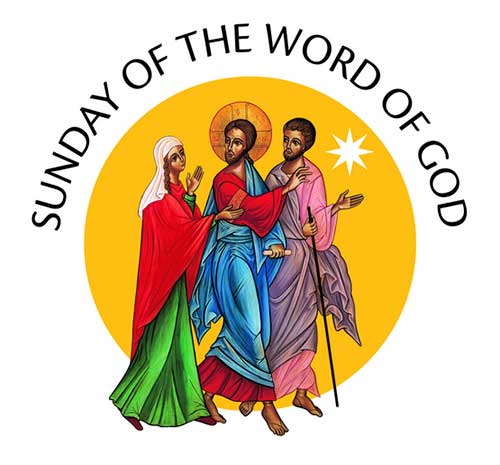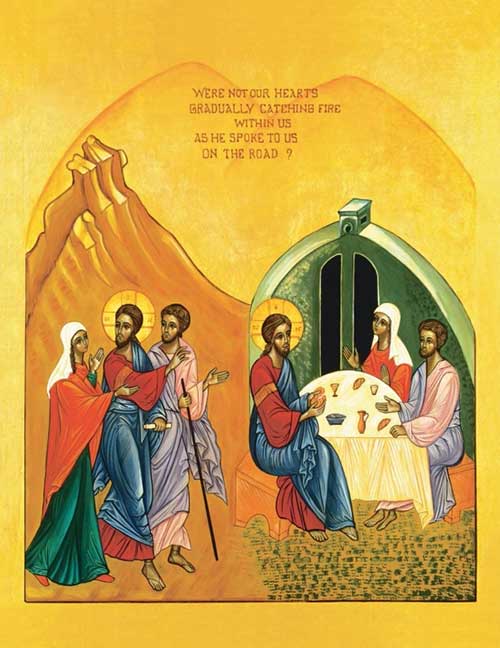
Many denominations and churches celebrate a “Bible Sunday” each year. But there is no agreed day to do this. I have seen July, August, October,…
In 2019, Pope Francis issued an Apostolic Letter (motu proprio), Aperuit illis, establishing for Roman Catholics the Third Sunday in Ordinary Time [Sunday between 21-27 January] as the Sunday of the Word of God. That’s this Sunday [24 January]. My suggestion is, as this is the date for Bible Sunday now celebrated by the majority of Christians, that we all unite in having this Sunday as our ecumenical Bible Sunday – our shared Sunday of the Word of God.
“Aperuit illis” are the first two words in the Risen Christ appearing (unrecognised) to two disciples on the Road to Emaus: “Then he opened their minds to understand the scriptures” (Luke 24:45). This is what begins the Pope’s letter. The Emmaus story became the logo (above) for the Word of God Sunday based on the icon (below) written by Sr Marie-Paul Farran.
I have long advocated that one have themed Sundays by all means BUT don’t change the agreed lectionary readings; don’t have “themed” readings ripped out of context by a concordance. [Have, for example, Social Services Sunday, but don’t change the agreed RCL/3Year readings for it; if you can’t find social points somewhere in the 3 agreed readings and the psalm then you shouldn’t be leading a community or preaching.] So there is no question that this Sunday Roman Catholics will abandon the lectionary to read concordance-picked readings about the Word of God. The way we treat the Bible in worship is a focus; preaching about the Bible; mentioning the Bible in prayers and in our singing,…
I suggest that you read the Pope’s letter in full.
In that letter, the Pope gives some suggestions:
The various communities will find their own ways to mark this Sunday with a certain solemnity. It is important, however, that in the Eucharistic celebration the sacred text be enthroned, in order to focus the attention of the assembly on the normative value of God’s word. On this Sunday, it would be particularly appropriate to highlight the proclamation of the word of the Lord and to emphasize in the homily the honour that it is due. Bishops could celebrate the Rite of Installation of Lectors or a similar commissioning of readers, in order to bring out the importance of the proclamation of God’s word in the liturgy. In this regard, renewed efforts should be made to provide members of the faithful with the training needed to be genuine proclaimers of the word, as is already the practice in the case of acolytes or extraordinary ministers of Holy Communion. Pastors can also find ways of giving a Bible, or one of its books, to the entire assembly as a way of showing the importance of learning how to read, appreciate and pray daily with sacred Scripture, especially through the practice of lectio divina.
Pope Francis (Aperuit illis 3)
The National Liturgy Office website of the Catholic Church in Aotearoa New Zealand gives some excellent suggestions.
I suggest the collect, based on Cranmer’s:
God of inspiration,
My commentary
you caused all holy scriptures to be written for our instruction,
grant us so to hear them, read, mark, learn, and inwardly digest them,
that by steadfastness and by the encouragement of your holy Word,
we may embrace and ever hold fast to the blessed hope of everlasting life,
which you have given us in our Saviour Jesus Christ,
who is alive with you in the unity of the Holy Spirit,
one God now and for ever.
Amen.
I am guessing that the Third Sunday in Ordinary Time was chosen as this is the Sunday when the Ordinary-Time systematic, semi-continuous reading of the Year’s Synoptic Gospel begins. Note also, that this does not clash for those who celebrate Candlemas moved to Sunday (this year, 31 January).
Resources beyond this site:
Textweek
Resourcing Preaching Down Under



